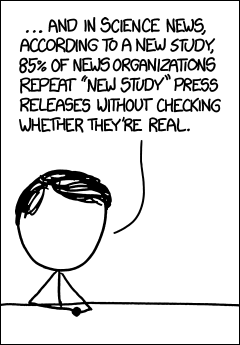Whenever I see an article that cites academic research in an oversimplified, generic way, one of my hobbies is to dig into the source papers to see if those glib statements are accurate1. For example, here’s a journey through an article that states that we supposedly get approximately the same type of pleasure from talking about ourselves on social media as we do from having sex.
Having said that, naturally this paragraph from The Guardian’s The secrets of the world’s happiest cities intrigued me:
Stutzer and Frey found that a person with a one-hour commute has to earn 40% more money to be as satisfied with life as someone who walks to the office.
This seemed exactly like the type of sweeping statement that every journalist thinks they can get away with because really, who’s going to read a 40-page academic paper to see if it’s true? Either that, or they don’t understand the research themselves. But let’s assume they’re cunning, not stupid.

Source: xkcd
Anyway, off I went to read the Stutzer and Frey paper Stress That Doesn’t Pay: The Commuting Paradox.
To understand what the paper actually says, we need to dig into the methodology just a little bit. The authors based their study on the principle of economic equilibrium, which is “a state where economic forces such as supply and demand are balanced and in the absence of external influences the (equilibrium) values of economic variables will not change.” They apply this to an underlying mathematical model that predicts that both the monetary and the mental costs of commuting are compensated for on the labor market (higher salaries) and the housing market (lower rent).
In short, what this means is that Utility (the authors use commuters’ reported satisfaction with life as a proxy measure for individual utility) is made up of three factors in this model:
- The negative effect of spending more time commuting
- The positive effect of earning a higher salary
- The positive effect of paying less for rent
The important thing to understand is that it’s all about equilibrium. When people spend longer time commuting, they self-report lower life satisfaction (Utility in our model). So this lower satisfaction has to be offset by higher salaries and/or lower rent to keep the equation in a state of equilibrium.
Ok, now we’re ready to look at that statement again. The Guardian‘s claim is derived from this section in the paper:
Before we discuss the potential explanations, we want to calculate how high the hurdle is. How far short of full compensation does the equilibrium prediction fall for people in the data set? In other words, how much additional income would a commuter have to earn in order to be as well off as somebody who does not commute?
The money quote is from this footnote:
Full compensation for commuting one hour (one way), compared with no commuting, is estimated to require an additional monthly income of approximately 515 Euro or 40 percent of the average monthly wage.
This shows us that there are two main issues with The Guardian’s quote:
- Earning more money doesn’t increase satisfaction with life. It just compensates for the lack of satisfaction (“Utility” in the formula) caused by longer commutes. Remember, this model is about economic equilibrium. You’re still less satisfied, the additional money just makes you ok with that. To put it another way: more money doesn’t increase satisfaction, it just makes up for the lack of satisfaction caused by the longer commute. You’re not happier, you just deal with the unhappiness because you’re getting paid more.
- It’s not “40% more money”, it’s 515 Euro, which equals 40% of the average monthly wage. For example, for commutes of 23 minutes (as opposed to one hour), that number is 242 Euros, which is equal to 18.86% of the average monthly wage.
A more accurate statement would therefore be this:
Stutzer and Frey found that a person with a one-hour commute has to earn 515 Euro more (or 40% of an average monthly wage in Germany) to compensate for the dissatisfaction caused by their long commute.
You might think that this is a storm in teacup. Why bother? So they printed a mildly inaccurate statement that most people will gloss over anyway, what’s the big deal? Well, the problem is that these things have a tendency to spread far and wide. Look at the number of retweets here:
A person w/ a 1hr commute has to earn 40% more money to be as satisfied with life as someone who walks to the office http://t.co/XZoOEKPs5H
— Charles Montgomery (@thehappycity) November 10, 2013
The statement is now even further out of context. Immediately we make the connection in our brains: more money = a more satisfied life. That’s not only not what the research says, we also know it’s just not true.
That’s why I think it’s important to call this kind of inaccuracy out, and why I want to encourage us to read the academic papers behind the easy percentages that get thrown around online. I learned a great deal about different economic and happiness models from this paper. It wasn’t boring at all, and I now understand what the research actually says. I think that’s time well spent.
-
Yes, I need to get out more. Noted. ↩